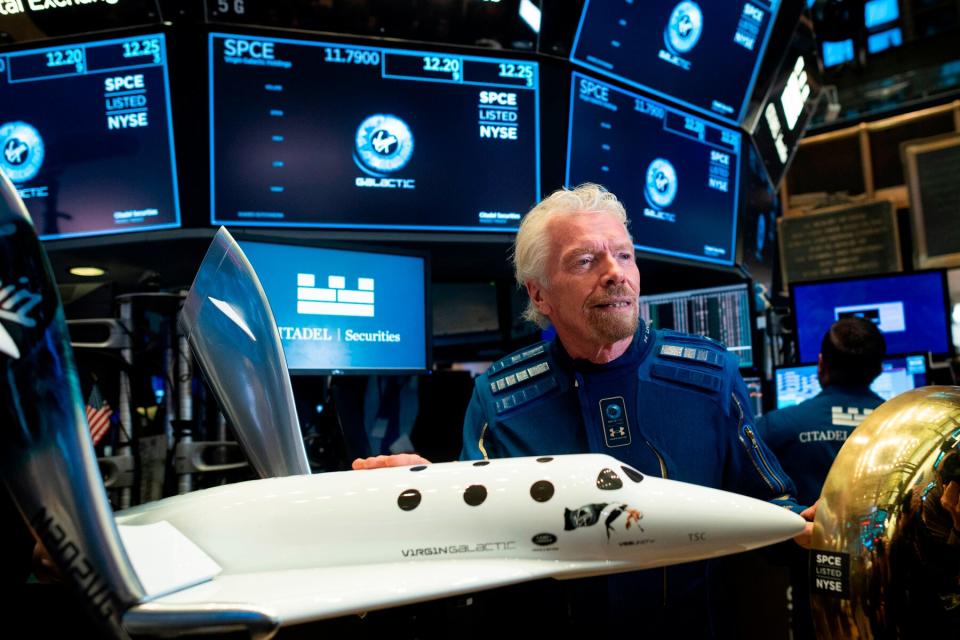Richard Branson and Jeff Bezos Both Plan to Travel to Space This Month — and Branson Is in the Lead
- Oops!Something went wrong.Please try again later.
The space industry was born out of competition in the 1950s, and it very much continues to thrive on it today. Back then, it was the United States versus the Soviet Union, but today, we're looking at the battle of the billionaires. Right now, it's Amazon founder Jeff Bezos versus Virgin mogul Sir Richard Branson, each of whom is trying to beat the other to space.
A few weeks ago, Bezos announced he'd be flying to space via his spaceflight company Blue Origin on July 20, the anniversary of the Apollo 11 moon landing. But Sir Richard Branson, owner of Blue Origin competitor Virgin Galactic, was not to be outdone by Bezos. On Thursday, Branson announced he'll be flying even sooner, on July 11, with a crew of employees.
Quite frankly, this one-upping is more about the billionaires' egos than anything else. Both companies have already had several successful test flights and are well on their way to flying customers.

JOHANNES EISELE/AFP via Getty Images
That said, Virgin Galactic is slightly ahead of Blue Origin in the testing race, having flown several people to space already (all employees, not customers), as its SpaceShipTwo spaceplane is piloted. Blue Origin, whose New Shepard vehicle is autonomous, has not yet flown a human — Bezos will be one of the first on July 20, alongside his brother, an as-of-yet-unnamed winner of an auction who paid $28 million for the seat, and aviation legend Wally Funk, who, at 82 years old, will become the oldest person ever to fly to space. But Blue Origin has had far more successful flights to space thus far: 15 compared to Virgin Galactic's three. (Not to mention Virgin Galactic's fatal test flight in 2014.)
Blue Origin also has altitude on its side. New Shepard will cross the Kármán line, or the internationally recognized boundary of space, at 100 km above Earth (about 62 miles), while Virgin Galactic's SpaceShipTwo will not reach that marker, though it will cross the United States' space threshold of 50 miles. (Blue Origin CEO Bob Smith reportedly made a jab about this little fact following Branson's announcement.)
Then, as far as actually starting up space tourism operations goes, Virgin Galactic is one small step closer, having received approval from the Federal Aviation Administration (FAA) last week to fly paying passengers. But if all goes according to plan, both companies could be flying space tourists as early as next year.
Now, we've made no mention of the third space-obsessed billionaire in the game: Elon Musk, founder of SpaceX. But Musk currently has no official plans to fly himself to space, despite his company being the most advanced private spaceflight operator in the world. (SpaceX launched 10 astronauts to the ISS in the past year, and it's already developing a new rocket to take humans to Mars — Musk has kind of won the whole private spaceflight game already.) But we're sure he'll throw a few jabs on Twitter about his competitors sometime soon. What's a race without a little heckling?
Stefanie Waldek is a freelance space, travel, and design journalist who would be happy to fly on either of the upcoming flights if the billionaires want to back out. Follow her on Instagram and Twitter at @stefaniewaldek.

